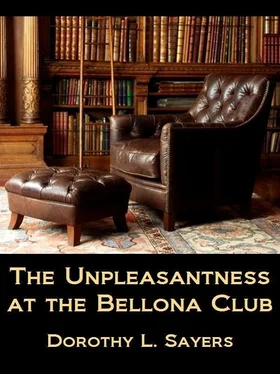Would they think it a pre-arranged blind, or perhaps — or mistake it for the falling-out of rogues among themselves? What would they think of this plain, sulky, inarticulate girl, who had never had any real friends, and whose clumsy and tentative graspings after passion had been so obscure, so disastrous?
Penberthy, too — but Penberthy was easier to understand. Penberthy, cynical and bored with poverty, found himself in contact with this girl, who might be so well-off some day. And Penberthy, the physician, would not mistake the need for passion that made the girl such easy stuff to work on. So he carried on — bored with the girl, of course — keeping it all secret, till he saw which way the cat was going to jump. Then the old man — the truth about the will — the opportunity. And then, upsettingly, Robert… Would the jury see it like that?
Wimsey leaned out of the cab window and told the driver to go to the Savoy. When they arrived, he handed the girl over to the cloak-room attendant. “I am going up to change,” he added, and turning, had the pleasure of seeing his sleuth arguing with the porter in the entrance-hall. Bunter, previously summoned by telephone, was already in attendance with his master’s dress clothes. Having changed, Wimsey passed through the hall again. The sleuth was there, quietly waiting. Wimsey grinned at him, and offered him a drink.
“I can’t help it, my lord,” said the detective.
“Of course not; you’ve sent for a bloke in a boiled shirt to take your place, I suppose?”
“Yes, my lord.”
“More power to his elbow. So long.”
He rejoined his charge and they went into the dining-room. Dressed in a green which did not suit her, she was undoubtedly plain. But she had character; he was not ashamed of her. He offered her the menu.
“What shall it be?” he asked. “Lobster and champagne?”
She laughed at him.
“Marjorie says you are an authority on food. I don’t believe authorities on food ever take lobster and champagne. Anyway, I don’t like lobster, much. Surely there’s something they do best here, isn’t there? Let’s have that.”
“You show the right spirit,” said Wimsey. “I will compose a dinner for you.”
He called the head waiter, and went into the question scientifically.
“ Huîtres Musgrave —I am opposed on principle to the cooking of oysters — but it is a dish so excellent that one may depart from the rules in its favour. Fried in their shells, Miss Dorland, with little strips of bacon. Shall we try it? — The soup must be tortue vraie, of course. The fish — oh! just a filet de sole, the merest mouthful, a hyphen between the prologue and the main theme.”
“That all sounds delightful. And what is the main theme to be?”
“I think a faisan rôti with Pommes Byron. And a salad to promote digestion. And, waiter — be sure the salad is dry and perfectly crisp. A soufflé glacé to finish up with. And bring me the wine-list.”
They talked. When she was not on the defensive, the girl was pleasant enough in manner; a trifle downright and aggressive, perhaps, in her opinions, but needing only mellowing.
“What do you think of the Romanée Conti?” he asked, suddenly.
“I don’t know much about wine. It’s good. Not sweet, like Sauterne. It’s a little — well — harsh. But it’s harsh without being thin — quite different from that horrid Chianti people always seem to drink at Chelsea parties.”
“You’re right; it’s rather unfinished, but it has plenty of body — it’ll be a grand wine in ten years’ time. It’s 1915. Now, you see. Waiter, take this away and bring me a bottle of the 1908.”
He leaned towards his companion.
“Miss Dorland — may I be impertinent?”
“How? Why?”
“Not an artist, not a bohemian, and not a professional man;—a man of the world.”
“What do you mean by those cryptic words?”
“For you. That is the kind of man who is going to like you very much. Look! that wine I’ve sent away — it’s no good for a champagne-and-lobster sort of person, nor for very young people — it’s too big and rough. But it’s got the essential guts, So have you. It takes a fairly experienced palate to appreciate it. But you and it will come into your own one day. Get me?”
“Do you think so?”
“Yes. But your man won’t be at all the sort of person you’re expecting. You have always thought of being dominated by somebody, haven’t you?”
“Well—”
“But you’ll find that yours will be the leading brain of the two. He will take great pride in the fact. And you will find the man reliable and kind, and it will turn out quite well.”
“I didn’t know you were a prophet.”
“I am, though.”
Wimsey took the bottle of 1908 from the waiter and glanced over the girl’s head at the door. A man in a boiled shirt was making his way in, accompanied by the manager.
“I am a prophet,” said Wimsey. “Listen. Something tiresome is going to happen — now, this minute. But don’t worry. Drink your wine, and trust.”
The manager had brought the man to their table. It was Parker.
“Ah!” said Wimsey, brightly. “You’ll forgive our starting without you, old man. Sit down. I think you know Miss Dorland.”
Parker bowed and sat down.
“Have you come to arrest me?” asked Ann.
“Just to ask you to come down to the Yard with me,” said Parker, smiling pleasantly and unfolding his napkin.
Ann looked palely at Wimsey, and took a gulp of the wine.
“Right,” said Wimsey. “Miss Dorland has quite a lot to tell you. After dinner will suit us charmingly. What will you have?”
Parker, who was not imaginative, demanded a grilled steak.
“Shall we find any other friends at the Yard?” pursued Wimsey.
“Possibly,” said Parker.
“Well, cheer up! You put me off my food, looking so grim. Hallo! Yes, waiter, what is it?”
“Excuse me, my lord; is this gentleman Detective-Inspector Parker?”
“Yes, yes,” said Parker, “what’s the matter?”
“You’re wanted on the ’phone, sir.”
Parker departed.
“It’s all right,” said Wimsey to the girl. “I know you’re straight, and I’ll damn well see you through.”
“What am I to do?”
“Tell the truth.”
“It sounds so silly.”
“They’ve heard lots of very much sillier stories than that.”
“But — I don’t want to — to be the one to—
“You’re still fond of him, then?”
“ No! — but I’d rather it wasn’t me.”
“I’ll be frank with you. I think it’s going to be between you and him that suspicion will lie.”
“In that case”—she set her teeth—“he can have what’s coming to him.”
“Thank the lord! I thought you were going to be noble and self-sacrificing and tiresome. You know. Like the people whose noble motives are misunderstood in chapter one and who get dozens of people tangled up in their miserable affairs till the family lawyer solves everything on the last page but two.”
Parker had come back from the telephone.
“Just a moment!” He spoke in Peter’s ear.
“Hallo?”
“Look here; this is awkward. George Fentiman—”
“Yes?”
“He’s been found in Clerkenwell.”
“Clerkenwell?”
“Yes; must have wandered back by ’bus or something. He’s at the police-station; in fact he’s given himself up.”
“Good lord!”
“For the murder of his grandfather.”
“The devil he has!”
“It’s a nuisance; of course it must be looked into. I think perhaps I’d better put off interrogating Dorland and Penberthy. What are you doing with the girl, by the way?”
Читать дальше












